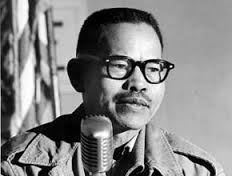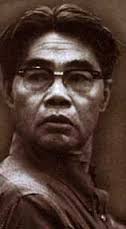Twice Betrayed
NEW YORK, NY—“Cesar Chavez,” the movie, directed by the Mexican actor Diego Luna, is a heartfelt and rousing portrait of its eponymous subject, the Chicano who rose to national and international prominence in the 1960s by being the face of the movement to boycott California grapes as a tactic to force the growers to improve the working conditions and pay of those who picked the fruit. The organization he headed was the United Farm Workers (UFW), the result of a merger between his and Dolores Huerta’s National Farm Workers Association (NFWA) and the mostly Filipino Agricultural Workers Organizing Committee (AWOC), then headed by Larry Itliong, and affiliated with the AFL-CIO.
Therein lies the startling absence at the center of this biopic.
Other than a few glimpses of the Filipino farmworkers’ on strike against the growers in California, Itliong and his fellow manong are relegated to the sidelines, as though they were merely incidental to the labor organizing in the fields, orchards, and canneries of the West Coast and Alaska.
And Philip Vera Cruz—he and Itliong were vice-presidents of the UFW—is nowhere to be seen, essentially a desaparecido. In the film, Chavez (portrayed convincingly by Michael Peña) talks about the plight of the powerless and the voiceless and the need for meaningful change. The rallying cry becomes Si Se Puede! (Yes, We Can!), echoed in Barack Obama’s first presidential campaign. The irony, of course, is that in its cursory treatment of the manong the film itself further abets their perceived powerlessness.
How very different from Carlos Bulosan’s America Is in the Heart! Bulosan, who himself worked the fields and later became a labor organizer, chronicles the gritty lives of these men (and they were mostly men), the intolerable hardships they faced simply because they were brown skinned, and their heroic efforts to earn a living wage and a respected place in the American landscape. His writing fleshes them out, warts and all.
No one questions Chavez’s role as a transformative figure, or that he deserves every bit of the accolades heaped upon him. A believer in the Gandhian doctrine of nonviolence and a vegan, he was a wily strategist, able to weave together the different groups with the same goals—Filipinos, Mexicans, civil rights group, students, Catholic clerics, among others—into a united front. No question his charisma attracted Senator Robert Kennedy to endorse the UFW’s program. But it was a movement, first and foremost, a perspective that somehow gets waylaid in Luna’s telling, very Hollywood in its focus on the redemptive individual.
The Filipino American National Historical Society (FANHS) has been critical of the way the movie frames this history, a history that continues to reverberate to this day, for instance, in the struggle of daily wage workers to have their minimum pay increased. Dr. Dawn Mabalon, a FAHNS board member, history professor at San Francisco State University and herself the author of Little Manila is in the Heart: The Making of the Filipino/a American community in Stockton, California, states that “We respect Diego Luna’s vision of a film about the heroic rise of Cesar Chavez. But as a history of the farmworkers’ struggle, the film falls short by downplaying, erasing and silencing the significant role that Filipinos and others played in the heroic struggle for farmworkers’ justice in California.” Mabalon said that while they recognize that the Hollywood film was not a documentary, the filmmakers nevertheless have “a responsibility to ensure that the history they present is accurate.”
While the challenges of creating an accurate portrait of a particular era and movement are formidable, nevertheless there were clearly moments in the film that the Filipino presence could have been acknowledged more robustly. For instance, a pivotal scene in the film comes after the growers finally accede to the demands of the UFW. The principals are seated at a table to sign the contract between them and the UFW. Itliong is seen not at the table as he was in reality but in the audience of onlookers. How could the director justify the excision of a figure as important as Larry Itliong?
It was Itliong after all who headed AWOC, when more than 1,500 AWOC members went on strike on Sept. 8, 1965, after the Delano grape-growers refused to increase the workers’ wages and instead hired Mexican temporary workers to replace the Filipinos. Itliong convinced Chavez and the NFWA to join the strike. In 1966, the AWOC and the NFWA merged to form the UFW Organizing Committee. Chavez was named director, while Itliong was the UFW’s assistant director from 1966 to 1971 and Philip Vera Cruz served on the UFW executive board.
Fortunately, there are other sources that tell the story of manong such as Itliong and Vera Cruz. Among these is the recently completed documentary, Marissa Aroy’s “Delano Manongs: Forgotten Heroes of the United Farm Workers,” which I hope to see soon. I’ve already mentioned Bulosan’s seminal work. There is also Philip Vera Cruz: A Personal History of Filipino Immigrants and the Farmworkers Movement, by Craig Scharlin and Lilia Villanueva. Curtis Choy’s “The Fall of the International Hotel,” documents the demolition in the 1970s of San Francisco’s famed single-room occupancy (SRO) hotel, home to many of the manong who came over as young men, drawn to the promise of a golden-hued, welcoming America only to be betrayed.
For all my disappointment in “Cesar Chavez,” I wouldn’t discourage anyone from seeing it. On the contrary, the fact that it has gotten nationwide distribution might spur Filipinos to similar wide-screen endeavors that tell our myriad stories. We certainly have enough Filipinos with deep pockets who can bankroll such endeavors. But where I sit, I don’t see any looming on the landscape with the vision and the faith to do so.
Copyright L.H. Francia 2014
RELATED STORIES
Historical society pans ‘Cesar Chavez’ film for inaccuracies
Two films differ over Cesar Chavez and the role of Filipinos in great farm strike
Law requires teaching of Fil-Am farm workers’ role in California labor history

